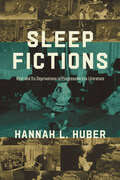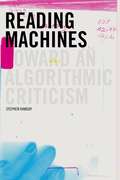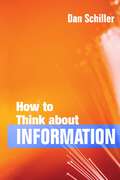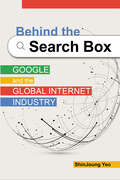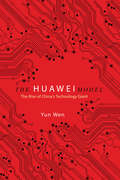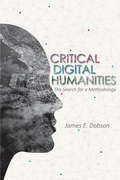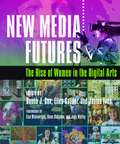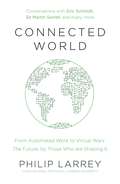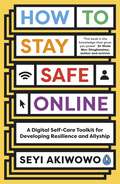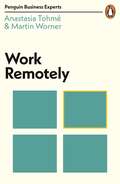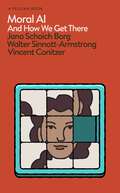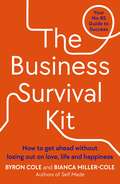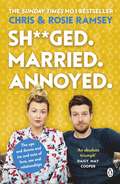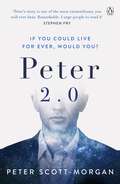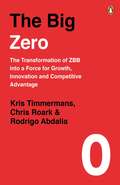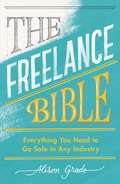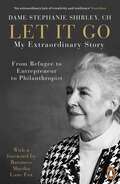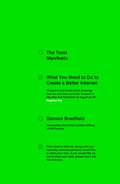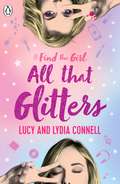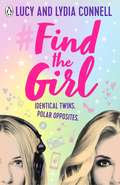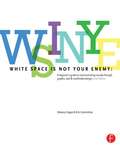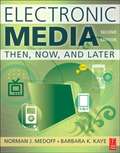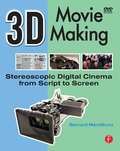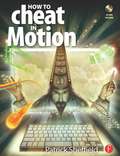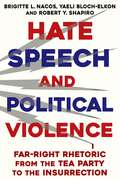- Table View
- List View
Sleep Fictions: Rest and Its Deprivations in Progressive-Era Literature (Topics in the Digital Humanities)
by Hannah L. HuberThe literary response to the dawning cult of wakefulness A turn-of-the-century influx of new technologies and the enormous impact of the electric light transformed not only individual sleeping habits but the ways American culture conceived and valued sleep. Hannah L. Huber analyzes the works of Henry James, Edith Wharton, Charles Chesnutt, and Charlotte Perkins Gilman to examine the literary response to the period’s obsession with wakefulness. As these writers blurred the separation of public and private space, their characters faced exhaustion in a modern world that permeated every moment of their lives with artificial light, traffic noise, and the social pressure to remain active at all hours. The implacable cultural clock and constant stress over physical limitations had an even greater impact on marginalized figures. Huber pays particular attention to how these writers rebutted Americans’ confidence in the body’s ability to conquer sleep with vivid portraits of the devastating consequences of sleep disruption and deprivation. The author also provides a website and text visualization tool that offers readers an interdisciplinary, deconstructed analysis of the book’s primary texts. The website can be found at: https://sleepfictions.org/sleep/scalar/index
Reading Machines: Toward an Algorithmic Criticism
by Stephen RamsayStephen Ramsay's intriguing study of computational text analysis examines how computers can be used as "reading machines" to open up entirely new possibilities for literary critics. Computer-based text analysis has been employed for the past several decades as a way of searching, collating, and indexing texts. Despite this, the digital revolution has not penetrated the core activity of literary studies: interpretive analysis of written texts. Computers can handle vast amounts of data, allowing for the comparison of texts in ways that were previously too overwhelming for individuals, but they may also assist in enhancing the entirely necessary role of subjectivity in critical interpretation. Reading Machines discusses the importance of this new form of text analysis conducted with the assistance of computers. Ramsay suggests that the rigidity of computation can be enlisted in the project of intuition, subjectivity, and play.
How to Think about Information
by Dan SchillerIt is common wisdom that the U.S. economy has adapted to losses in its manufacturing base because of the booming information sector, with high-paying jobs for everything from wireless networks to video games. We are told we live in the Information Age, in which communications networks and media and information services drive the larger economy. While the Information Age may have looked sunny in the beginning, as it has developed it looks increasingly ominous: its economy and benefits grow more and more centralized--and in the United States, it has become less and less subject to democratic oversight. Corporations around the world have identified the value of information and are now seeking to control its production, transmission, and consumption. In How to Think about Information, Dan Schiller explores the ways information has been increasingly commodified as a result and how it both resembles and differs from other commodities. Through a linked series of theoretical, historical, and contemporary studies, Schiller reveals this commodification as both dynamic and expansionary, but also deeply conflicted and uncertain. He examines the transformative political and economic changes occurring throughout the informational realm and analyzes key dimensions of the process, including the buildup of new technological platforms, the growth of a transnationalizing culture industry, and the role played by China as it reinserts itself into an informationalized capitalism.
Behind the Search Box: Google and the Global Internet Industry (The Geopolitics of Information)
by ShinJoung YeoOnce seen as a harbinger of a new enlightened capitalism, Google has become a model of robber baron rapaciousness thanks to its ruthless monetizing of private data, obsession with monopoly, and pervasive systems of labor discrimination and exploitation. Using the company as a jumping-off point, ShinJoung Yeo explores the political economy of the search engine industry against the backdrop of the relationship between information and capitalism’s developmental processes. Yeo’s critical analysis draws on in-depth discussions of essential issues like how the search engine evolved into a ubiquitous commercial service, it’s place in a global information business that is restructuring the information industry and our very social lives, who exactly designs and uses search technology, what kinds of workers labor behind the scenes, and the influence of geopolitics. An incisive look at a pervasive presence in our lives, Behind the Search Box places the search engine industry’s rise and ongoing success within an original political economy of digital capitalism.
The Huawei Model: The Rise of China's Technology Giant (The Geopolitics of Information)
by Yun WenIn 2019, the United States' trade war with China expanded to blacklist the Chinese tech titan Huawei Technologies Co. Ltd. The resulting attention showed the information and communications technology (ICT) firm entwined with China's political-economic transformation. But the question remained: why does Huawei matter? Yun Wen uses the Huawei story as a microcosm to understand China's evolving digital economy and the global rise of the nation's corporate power. Rejecting the idea of the transnational corporation as a static institution, she explains Huawei's formation and restructuring as a historical process replete with contradictions and complex consequences. She places Huawei within the international political economic framework to capture the dynamics of power structure and social relations underlying corporate China's globalization. As she explores the contradictions of Huawei's development, she also shows the ICT firm's complicated interactions with other political-economic forces. Comprehensive and timely, The Huawei Model offers an essential analysis of China's dynamic development of digital economy and the global technology powerhouse at its core.
Critical Digital Humanities: The Search for a Methodology (Topics in the Digital Humanities)
by James E DobsonCan established humanities methods coexist with computational thinking? It is one of the major questions in humanities research today, as scholars increasingly adopt sophisticated data science for their work. <P><P>James E. Dobson explores the opportunities and complications faced by humanists in this new era. Though the study and interpretation of texts alongside sophisticated computational tools can serve scholarship, these methods cannot replace existing frameworks. <P><P>As Dobson shows, ideas of scientific validity cannot easily nor should be adapted for humanities research because digital humanities, unlike science, lack a leading-edge horizon charting the frontiers of inquiry. <P><P>Instead, the methods of digital humanities require a constant rereading. At the same time, suspicious and critical readings of digital methodologies make it unwise for scholars to defer to computational methods. <P><P>Humanists must examine the tools--including the assumptions that went into the codes and algorithms--and questions surrounding their own use of digital technology in research. <P><P>Insightful and forward thinking, Critical Digital Humanities lays out a new path of humanistic inquiry that merges critical theory and computational science.
New Media Futures: The Rise of Women in the Digital Arts
by Donna Cox Ellen Sandor Janine FronTrailblazing women working in digital arts media and education established the Midwest as an international center for the artistic and digital revolution in the 1980s and beyond. Foundational events at the University of Illinois and the School of the Art Institute of Chicago created an authentic, community-driven atmosphere of creative expression, innovation, and interdisciplinary collaboration that crossed gender lines and introduced artistically informed approaches to advanced research. Interweaving historical research with interviews and full-color illustrations, New Media Futures captures the spirit and contributions of twenty-two women working within emergent media as diverse as digital games, virtual reality, medicine, supercomputing visualization, and browser-based art. The editors and contributors give voice as creators integral to the development of these new media and place their works at the forefront of social change and artistic inquiry. What emerges is the dramatic story of how these Midwestern explorations in the digital arts produced a web of fascinating relationships. These fruitful collaborations helped usher in the digital age that propelled social media. Contributors: Carolina Cruz-Niera, Collen Bushell, Nan Goggin, Mary Rasmussen, Dana Plepys, Maxine Brown, Martyl Langsdorf, Joan Truckenbrod, Barbara Sykes-Dietz, Abina Manning, Annette Barbier, Margaret Dolinsky, Tiffany Holmes, Claudia Hart, Brenda Laurel, Copper Giloth, Jane Veeder, Sally Rosenthal, and Lucy Petrovic.
Connected World: From Automated Work to Virtual Wars: The Future, By Those Who Are Shaping It
by Father Philip LarreyThe world as we know it is changing. Driverless cars, drone deliveries and autonomous weapon systems are no longer the stuff of science fiction.But what's next for technology and business, and how will it impact our society?In Connected World, Philip Larrey of the Pontifical Lateran University explores the consequences of the new digital age in conversation with leaders including Sir Martin Sorrell, CEO of WPP, Eric Schmidt, CEO of Google's parent company Alphabet, and Maurice Lévy, CEO of Publicis Groupe.Ranging from the death of privacy to the rise of artificial intelligence, Connected World asks the existential questions which will come to define our age.
How to Stay Safe Online: A digital self-care toolkit for developing resilience and allyship
by Seyi AkiwowoA powerful, comprehensive guide to spotting, responding to and proactively defending yourself from online abuse - and learning how to be a good ally to those experiencing it.'The need-to-know, must-have and barrier breaking book on fighting online abuse that everyone must have a copy of' Dr Shola Mos-Shogbamimu'A book written from the front line of life online - heartfelt, heart-breaking, practical, brilliant' Richard Curtis ______________________________________ Digital spaces are a positive force for change, connection and community, but left unregulated, they are not always safe. Globally, women are 27 times more likely than men to be harassed online. Black women are 84% more likely to face online harassment than white. There has been a 71% rise in online disability abuse and 78% of LGBTQ+ people have experienced hate speech online. How to Stay Safe Online is an urgent, necessary digital self-care tool from leading activist for online equality Seyi Akiwowo. With a blend of practical advice, Seyi's personal experiences and interviews with Jameela Jamil, Hera Hussain, Laura Bates and Yassmin Abdel-Magied, this book will: * Provide practical tips on how to confidently navigate online spaces * Equip you with a range of responses to online abuse and how to effectively report * Teach you how to set boundaries and use the internet as a force for good* Empower friends, teachers and parents to help victims * Help you create your own digital self-care plan This will be the go-to guide to developing resilience, greater compassion for others and authentic allyship online. ______________________________________'Seyi Akiwowo's work to make the online world safer, especially for Black women, is not only powerful, it's necessary' Nova Reid 'This helpful book is a crucial companion' Emma Gannon 'No one should be using the internet without having read this book' Alex Holder 'Accessible, empowering and potentially life-changing [...] everyone should read' Laura Bates'Seyi is one of the most important voices of our generation [...] I hope this book gets added to the national curriculum' Poppy Jamie
Work Remotely (Penguin Business Experts Series)
by Anastasia Tohmé Martin WornerRemote working makes us happier, more productive and more profitable, but it can bring its own set of challenges. How do we manage our work-life balance; communicate and collaborate effectively as teams; and ensure our technology is efficient?In Work Remotely, Penguin Business Experts Anastasia Tohmé and Martin Worner explain everything you need to know:- Set your own targets and monitor productivity- Establish boundaries between working hours and free time- Manage effective communication and decision-making at a distanceIncluding case studies from the companies around the world who are innovating and revolutionizing the way we work, Work Remotely shares useful advice and practical tips to ensure you get the most out of working away from the office environment.
Moral AI: And How We Get There (Pelican Books)
by Jana Schaich Borg Walter Sinnott-Armstrong Vincent ConitzerA balanced and thought-provoking guide to all the big questions about AI and ethics Can computers understand morality? Can they respect privacy? And what can we do to make AI safe and fair? The artificial intelligence revolution has begun. Today, there are self-driving cars on our streets, autonomous weapons in our armies, robot surgeons in our hospitals – and AI's presence in our lives will only increase. Some see this as the dawn of a new era in innovation and ease; others are alarmed by its destructive potential. But one thing is clear: this is a technology like no other, one that raises profound questions about the very definitions of human intelligence and morality. In Moral AI, world-renowned researchers in moral psychology, philosophy, and artificial intelligence – Jana Schaich Borg, Walter Sinnott-Armstrong and Vincent Conitzer – tackle these thorny issues head-on. Writing lucidly and calmly, they lay out the recent advances in this still nascent field, peeling away the exaggeration and misleading arguments. Instead, they offer clear examinations of the moral concerns at the heart of AI programs, from racial equity to personal privacy, fake news to autonomous weaponry. Ultimately, they argue that artificial intelligence can be built and used safely and ethically, but that its potential cannot be achieved without careful reflection on the values we wish to imbue it with. This is an essential primer for any thinking person.
The Business Survival Kit: How to get ahead without losing out on love, life and happiness
by Bianca Miller-Cole Byron Cole***SUNDAY TIMES BESTSELLER***With straightforward, heart-felt advice, The Business Survival Kit guides you to a thriving business while nurturing your humanity -- Marie Forleo, #1 NY Times bestselling author of Everything is Figureoutable This book will help you make clearer, smarter, braver decisions in all areas of your life -- Emma Gannon, author of The Multi-Hyphen MethodStarting a business isn't easy. In fact, it can be scary, exhausting and demoralising. When it finally takes off, even though you're fulfilling a lifelong dream, it can be a struggle to keep up with the rest of your life. How can you cope with the inevitable stresses and strains along the way?In The Business Survival Kit, serial entrepreneurs Byron Cole and Bianca Miller-Cole prepare you for the ride of your life. With straight-talking advice and insights from leading experts it will help you answer the fundamental question of whether you can handle being an entrepreneur in the first place and then help you navigate the inevitable ups and many downs that go hand in hand with that decision. Learn how to: *Cope with stress, anxiety and uncertainty*Build your confidence and tackle impostor syndrome *Maintain a healthy work/life balance*Build strong networks and nurture your personal relationships *And stay motivated (even in the midst of failure)
Sh**ged. Married. Annoyed.: The Sunday Times No. 1 Bestseller
by Chris Ramsey Rosie RamseyWhether you've barely recovered from spending lockdown with your other half or desperately heading back to the clubs to meet 'the one', SH**GED. MARRIED. ANNOYED. is here to see you through . . .THE SUNDAY TIMES BESTSELLER FROM THE STARS OF THE CHART-TOPPING PODCASTNOW FEATURING A BONUS CHAPTER'An absolute triumph' Daisy May Cooper'These two are bloody hilarious' Zoe Sugg'A hilarious look at the highs and lows of relationships' Sun__________SH**GED.Hitting the bars, necking drinks and necking strangers, stumbling home, one-night-stands, nightmare dates, thinking this one's alright, ghosting, tears, more drinking, living off late-night chips.MARRIED.Meeting 'the one', weekends away, moving in, declaring life-long love, stags and hens, the perfect wedding, the honeymoon period, getting through the hard bits together, starting a family.ANNOYED.Can you close the bathroom door if you're doing that? Sleepless nights, arguing about whose turn it is to change the baby's nappy, toys everywhere, only having two drinks, still being hungover, wondering when it all stopped being easy.Whether you're sh**ged, married, annoyed, or all of the above, Chris and Rosie Ramsey write hilariously and with honesty about the ups and downs of dating, relationships, arguing, parenting and everything in between.
Peter 2.0: The Human Cyborg
by Peter Scott-MorganThe incredible book behind the primetime Channel 4 documentary, Peter: The Human Cyborg'A remarkable account of what it means to be human and what technology can really achieve' Sunday Telegraph'Peter's story is one of the most extraordinary you will ever hear. I urge people to read it' Stephen Fry'A remarkable story . . . you're left desperate to take nothing for granted' Radio Times __________ Peter, a brilliant scientist, is told that he will lose everything he loves. His husband. His family. His friends. His ability to travel the world. All will be gone. But Peter will not give up. He vows that this will not be the end and instead seeks a completely new beginning . . . Peter has Motor Neurone Disease, a condition universally considered by doctors to be terminal. He is told it will destroy his nerve cells and that within about two years, it will take his life too. But, face-to-face with death, he decides there is another way. Using his background in science and technology, he navigates a new path, one that will enable him not just to survive, but to thrive. This is the astonishing true story about Peter Scott-Morgan: the first person to combine his very humanity with artificial intelligence and robotics to become a full Cyborg. His discovery means that his terminal diagnosis is negotiable, something that will rewrite the future.And change the world. By embracing love, life and hope rather than fear, tragedy and despair, he will become Peter 2.0. __________'Compelling . . . Scott-Morgan is a true one-off. It is in the telling of the love story, rather than the technical details of becoming a cyborg, that this book succeeds' The Times 'What's striking is Peter's constant optimism, bravery and his ability to find radical answers to problems that have confounded Britain's brightest minds' Daily Telegraph 'A soaring love story' Financial Times 'Fascinating and extremely moving' Sun
The Big Zero: The Transformation of ZBB into a Force for Growth, Innovation and Competitive Advantage
by Kris Timmermans Chris Roark Rodrigo AbdallaDo you want to achieve startup speed at enterprise scale? Growth. It's what every company strives for. But it's become more and more elusive as companies struggle to hit their projected growth rates in an increasingly competitive market. While zero-based budgeting (ZBB) has been wielded for decades to cut costs, it falls short when it comes to spurring growth. But a zero-based mindset (ZBx) does that and more. ZBx facilitates forensic oversight into resource allocation that funnels savings back into growth initiatives and encourages new sources of innovation. The Big Zero shows how a ZBx approach focuses on agility over austerity, visibility over guesswork and the future over the past to fuel growth and competitiveness.
The Freelance Bible: Everything You Need to Go Solo in Any Industry
by Alison Grade'Finally! The book that millions of people have been crying out for. An empowering guide of how to use your work to achieve independence, inspiration and - crucially - balance' Bruce Daisley, author of The Joy of Work and VP,TwitterYou want to go freelance. You want to make your career work for you, on your terms and determined by your own definition of success. You want autonomy, flexibility and variety.But where do you start?In The Freelance Bible, award-winning entrepreneur and freelancer, Alison Grade, guides you through absolutely everything that you need to know to start your successful self-employed life.Starting from day one, she will help you develop your personal brand, pick up the financial essentials, grow your client base, manage your work-life balance, negotiate deals and value your time as you become more established. This is your complete guide to turning your talent into a fulfilling and sustainable career.'Alison strikes an excellent and inspirational balance; sharing tips and advice that help you work out how to be secure in insecurity and ace the journey to becoming a freelancer' Alex Mahon CEO, Channel 4
Let It Go: My Extraordinary Story - From Refugee to Entrepreneur to Philanthropist
by Dame Stephanie Shirley CH Richard AskwithA moving memoir from a woman who made a fortune in a man's world and then gave it all away...soon to be turned into a filmIn 1962, Stephanie 'Steve' Shirley created a software company when the concept of software barely existed. Freelance Programmers employed women to work on complex projects such as Concorde's black box recorder from the comfort of their own home. Shirley empowered a generation of women in technology, giving them unheard of freedom to choose their own hours and manage their own workloads. The business thrived and Shirley gradually transferred ownership to her staff, creating 70 millionaires in the process.Let It Go explores Shirley's trail blazing career as an entrepreneur but it also charts her incredible personal story - her dramatic arrival in England as an unaccompanied Kindertransport refugee during World War Two and the tragic loss of her only child who suffered severely from Autism.Today, Dame Stephanie Shirley is one of Britain's leading philanthropists, devoting most of her time, energy and wealth to charities that are close to her heart. In Let It Go, Shirley tells her inspirational story and explains why giving her wealth away - letting it go - has brought her infinitely more happiness and fulfilment than acquiring it in the first place.Co-written with Richard Askwith, the former Executive Editor of The Independent and the award-winning author of seven books in his own name, including biographies of Emil Zátopek and Lata Brandisová.'An extraordinary tale of creativity and resilience' - Guardian'This engrossing story of an extraordinary life is filled with lessons in what it means to be human' - Financial Times
The Trust Manifesto: What you Need to do to Create a Better Internet
by Damian BradfieldFrom the moment we wake up and unlock our phones, we're producing data. We offer up our unique fingerprint to the online world, scan our route to work, listen to a guided meditation or favourite playlist, slide money around, share documents and update our social media accounts. We reach for our phones up to 200 times a day, not knowing which companies are storing, using, selling and manipulating our data. But do we care? We're busy. We've got lives. We're pressed for time! There aren't enough hours in the day to read the terms and conditions. Or, maybe we're happy to trade our personal data for convenient services and to make our lives easier?Big data is the phenomenon of our age, but should we trust it without question? This is the trust dilemma.In 2009, Damian Bradfield founded WeTransfer, the largest file-sharing platform in the world with 50 million global users shipping more than one billion files of data a month. His unique experience of the big data economy has led him to question if there is another way to build the internet, one that is fairer and safer for everyone and, in The Trust Manifesto, he lays out this vision.
Find The Girl: All That Glitters
by Lucy ConnellNancy Palmer used to be Insta-famous and her twin Nina used to shy away from everyone. Things can change pretty quickly. Nina has been accepted onto a Guildhall music course and is famous because of her pop star boyfriend, Chase. Nancy is trying to put her name on the map by becoming a music journalist and is not getting distracted by Chase's hot bandmate Miles. When their estranged dad shows up out of the blue and shows an interest in Nina's budding music career, Nancy isn't sure he's just there to make amends. As they attempt to find their way through new challenges, they both have to remember that you have to pave your own path to success and sometimes fame comes at a price.
Find The Girl
by Lucy Connell Lydia ConnellThe perfect summer read for fans of Girl Online and Rainbow Rowell! ----- Falling for your best friend's love interest is bad...Falling for your twin's is catastrophic.As kids, Nina and Nancy were inseparable. As teenagers, not so much...Where Nancy is popular, an Instagram star, and obsessed with boy band heartthrob Chase, Nina is shy; a talented classical musician, and shuns the spotlight that her sister thrives in.But when the wrong twin unwittingly ends up at the centre of a romantic social media storm, the bonds of twin-ship will be tested like never before... Written in collaboration with Katy Birchall, #FINDTHEGIRL is a very modern twist on a Cinderella story.
White Space Is Not Your Enemy: A Beginner's Guide To Communicating Visually Through Graphic, Web And Multimedia Design
by Kim Golombisky Rebecca HagenDesigning a website or brochure without an art background? Then step away from the computer and read this engaging, conversational introduction to visual communications first. Written for the beginner, White Space is Not Your Enemy, Second Edition, is a practical graphic design and layout guide that introduces the concepts and practices necessary for producing effective visual communication across a variety of formats--from web to print. <P><P> This beautifully illustrated, full-color book covers all of the basics to help you develop your eye and produce evocative designs that work. Topics include: <P> * What is design? <P> * Pre-design research and brainstorming. <P> * The "works-every-time layout" and "13 layout sins." <P> * The elements and principles of design. <P> * Layouts for impact. <P> * Getting along with type. <P> * Choosing and using color. <P> * Working with photos and illustrations. <P> * Intros to infographics, storyboarding and multimedia components. <P> * Output for the web and print. <P> Visit www. whitespacedesignbook. com for additional supporting materials.
Electronic Media: Then, Now, And Later (Second Edition)
by Norman Medoff Barbara K. KayeElectronic Media connects the traditional world of broadcasting with the contemporary universe of digital electronic media. It provides a synopsis of the beginnings of electronic media in broadcasting, and the subsequent advancements into digital media. Underlying the structure of the book is a "See It Then, See It Now, See It Later" approach that focuses on how past innovations lay the groundwork for changing trends in technology, providing the opportunity and demand for change in both broadcasting and digital media. FYI and Zoom-In boxes point to further information, tying together the immediate and long-ranging issues surrounding electronic media. Career Tracks feature the experiences of industry experts and share tips in how to approach this challenging industry.
3D Movie Making: Stereoscopic Digital Cinema From Script To Screen
by Bernard MendiburuHollywood is going 3D! Join the revolution with this primer to all of the essential skills for live action 3D, from preproduction through distribution. 3D perception and science is presented in an accessible way that provides the principles of Stereoscopic vision you need to make the transition from the 2D world. Tools of the trade are enumerated with an eye on current constraints and what is coming down the pike to smooth the way. Step-by-step instructions detail how 3D processes affect every stage of the production including screenwriting, art direction, principle photography, editing, visual effects and distribution. The companion DVD includes an array of 2D and 3D images that demonstrate concepts and techniques, 3D movie shorts that showcase alternative techniques, After Effects project files to explore and manipulate for effect, and a resource list of software tools and tutorials that demonstrate techniques. The DVD is not included with the E-book. Please contact the publisher for access to the DVD content by emailing dennis.mcgonagle@taylorandfrancis.com
How to Cheat in Motion
by Patrick SheffieldThe text provides a "cookbook" style of learning computer animation, presenting the user with specific recipes to achieve desirable outcomes. This practical guide helps readers to enhance titles, motion graphics and visual effects with Motion. Step-by-step instruction is concisely described and lavishly illustrated.
Hate Speech and Political Violence: Far-Right Rhetoric from the Tea Party to the Insurrection
by Brigitte L. Nacos Robert Shapiro Yaeli Bloch-ElkonHow did the United States descend into crisis, with institutions frayed, political violence mounting, and democracy itself in peril? This timely book identifies how the Tea Party and its extremist narratives laid the groundwork for the rise of Donald Trump, his MAGA movement, and the January 6, 2021, assault on the Capitol.Brigitte L. Nacos, Yaeli Bloch-Elkon, and Robert Y. Shapiro trace the escalation of a strain of extremist rhetoric in right-wing political discourse after the inauguration of Barack Obama. Drawing on extensive and in-depth analysis of political communication in both traditional media and online spaces, they demonstrate how the dominant rhetorical styles of the Trump era were pioneered by the Tea Party. A backlash to the election of the first Black president, this reactionary social movement deployed violent language and spread anti-Obama paranoia, with the assistance of media insiders, GOP leaders, and conservative advocacy groups. Donald Trump rose to political prominence by hitching himself to the “birther” racist conspiracy theory, espoused by many Tea Partiers, and drew from their aggressive and hyperpartisan repertoire. Ultimately, this book shows, the increasingly violent rhetoric of right-wing extremists spilled over into real-world political violence. Revealing the path the Tea Party blazed to Trump and the insurrectionists, Hate Speech and Political Violence provides timely new insights into the threats facing American democracy.
